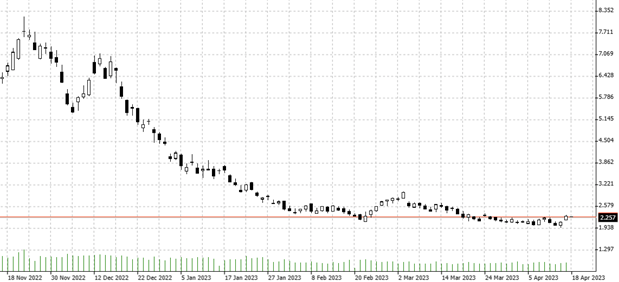

18.04.2023 –The energy market and consumers have responded to the Ukraine war. The Gazprom gap appears to be closed. Globally, there is currently an oversupply of liquefied natural gas.
The U.S. in particular has stepped in as a major exporter for Russia. Pictured here is the daily chart of Natural Gas. According to Bloomberg, the global market is currently virtually flooded with natural gas.

Source: Bernstein Bank GmbH
This is because demand is subdued. Due to the predominantly mild winter and the reduction of consumption in the West, inventories filled up from South Korea to Spain. As a result, tankers carrying LNG often have trouble finding a port, according to Bloomberg, and are at sea for weeks. LNG means Liquefied Natural Gas, which is natural gas that is liquefied by pressure and cooling, loses volume and can thus be transported on special tankers.
Global oversupply
This threatens a glut of gas that could keep pressure on LNG prices in the coming weeks, Bloomberg Intelligence further judged. Meanwhile, global LNG exports climbed toward an all-time high in March, partly due to an increase in U.S. production, it said. In addition, China reported record LNG exports again, according to Corona. Japan, actually a large buyer of LNG, was offering supplies to prevent oversupply at home, RBC Capital Markets also explained.
Fuel and fertilizer
Others are nevertheless bullish on the matter because of the indispensability of gas. Natural gas is used to produce chemicals, fertilizer and hydrogen; as well as fuel for power plants in energy generation. About 20 percent of Europe’s electricity came from gas-fired power plants last year, according to S&P. With Russia gone, the market no longer has a buffer, James Henderson, head of gas research at the Oxford Institute for Energy Studies told “S&P Global Commodity Insights.” Tsvetana Paraskova of Oilprice.com, meanwhile, warned that more than a dozen LNG export projects in the U.S. are at risk. That’s because increased costs and tougher competition for financing could torpedo the terminals.
We look forward to seeing how the natural gas situation develops. Bernstein Bank wishes successful trades and investments!
_________________________________________________________________________
The content of this publication is for general information purposes only. In this context, it is neither an individual investment recommendation or advice nor an offer to purchase or sell securities or other financial products. The content in question and all the information contained therein do not in any way replace individual investor- or investment-oriented advice. No reliable forecast or indication for the future is possible with respect to any presentation or information on the present or past performance of the relevant underlying assets. All information and data presented in this publication are based on reliable sources. However, Bernstein Bank does not guarantee that the information and data contained in this publication is up-to-date, correct and complete. Securities traded on the financial markets are subject to price fluctuations. A contract for difference (CFD) is also a financial instrument with leverage effect. Against this backdrop, CFD trading involves a high risk up to the point of total loss and may not be suitable for all investors. Therefore, make sure that you have fully understood all the correlating risks. If necessary, ask for independent advice. CFDs are complex instruments and are associated with the high risk of losing money quickly because of the leverage effect. 68% of retail investor accounts lose money trading CFD with this provider. You should consider whether you understand how CFD work and whether you can afford to take the high risk of losing your money.7
